- Home
- Stephanie Laurens
The Ideal Bride (Cynster Novels)
The Ideal Bride (Cynster Novels) Read online
The Ideal Bride
Stephanie Laurens
CONTENTS
Chapter 1
Chapter 2
Chapter 3
Chapter 4
Chapter 5
Chapter 6
Chapter 7
Chapter 8
Chapter 9
Chapter 10
Chapter 11
Chapter 12
Chapter 13
Chapter 14
Chapter 15
Chapter 16
Chapter 17
Chapter 18
Chapter 19
Chapter 20
Chapter 21
Chapter 22
This is a work of fiction. The characters, incidents, and dialogues are products of the author’s imagination and are not to be construed as real. Any resemblance to actual events or persons, living or dead, is entirely coincidental.
The Ideal Bride. Copyright © 2004 by Savdek Management Proprietory Ltd. All rights reserved. Printed in the United States of America. No part of this book may be used or reproduced in any manner whatsoever without written permission except in the case of brief quotations embodied in critical articles and reviews. For information address HarperCollins Publishers Inc., 10 East 53rd Street, New York, NY 10022.
HarperCollins books may be purchased for educational, business, or sales promotional use. For information please write: Special Markets Department, HarperCollins Publishers Inc., 10 East 53rd Street, New York, NY 10022.
FIRST EDITION
Designed by Renato Stanisic
Printed on acid-free paper
Library of Congress Cataloging-in-Publication Data
Laurens, Stephanie.
The ideal bride / by Stephanie Laurens.—1st ed.
p. cm.
ISBN 0-06-050573-
. Cynster family (Fictitious characters)—Fiction. 2. Hampshire (England)— Fiction. I. Title.
PR9619.3.L376I34 2004 813‘.54—dc22_
WBC/RRD
To my four fellow “Rogue Authors” —
Victoria Alexander, Susan Andersen, Patti Berg, and Linda Needham— I wouldn’t stay sane without you.
With much love,
SL
Chapter 1
Late June,
Eyeworth Manor, near Fritham in the New Forest, Hampshire
Wife, wife, wife, wife.
Michael Anstruther-Wetherby swore beneath his breath. That refrain had plagued him for the last twenty-four hours. When he’d driven away from Amelia Cynster’s wedding breakfast, it had run to the rhythm of his curricle’s wheels; now it was playing to the steady clop of his bay gelding’s hooves.
Lips setting, he wheeled Atlas out of the stableyard and set out along the drive circling his home.
If he hadn’t gone to Cambridgeshire to attend Amelia’s wedding, he d already be one step closer to being an affianced man. But the wedding had been one event he hadn’t even thought of missing; aside from the fact that his sister Honoria, Duchess of St. Ives, had been the hostess, the wedding had been a family gathering and he valued family ties.
Familial links had helped him immeasurably in recent years, first in gaining his position as Member of Parliament for this district, and subsequently in forging his path upward through the ranks, yet that wasn’t the wellspring of his appreciation; family had always meant a great deal to him.
Rounding his house, a sturdy, three-storied manor house built of gray stone, his gaze went—as it always did when he passed this way— to the monument that stood on the verge halfway between the house and the gates. Set against the dark-leaved shrubs filling the gaps beneath the tall trees, the simple stone had stood for fourteen years; it marked the spot where his family—his parents and younger brother and sister racing home in a curricle in the teeth of a storm—had been killed by a falling tree. He and Honoria had witnessed the accident from the schoolroom windows high above.
Perhaps it was simply human nature to value highly something one had lost.
Left shocked, grieving, and adrift, he and Honoria had still had each other, but with him barely nineteen and her sixteen, they’d had to part. They’d never lost touch—they were, even now, close—but Honoria had since met Devil Cynster; she now had a family of her own.
Slowing Atlas as he approached the stone, Michael was acutely aware that he did not. His life was full to bursting, his schedule perennially crammed; it was only in moments like this that the lack shone so clearly, and loneliness jabbed.
He paused, studying the stone, then, jaw setting, faced forward and flicked the reins. Atlas picked up his pace; passing through the gates, Michael held him to a steady canter along the narrow lane.
The nightmarish sound of horses screaming slowly faded.
Today he was determined to take the first step toward establishing a family of his own.
Wife, wife, wife, wife.
The countryside closed around him, embraced him in its lush green arms, welcomed him into the woods and forests that to him were the essence of home. Sunlight flickered, glimmered through shifting leaves. Birds called and twittered; beyond the rustle of the canopies, there was no other sound to punctuate the clop of Atlas’s hooves. Narrow and winding, the lane led nowhere but to the Manor, joining a wider road that led south to Lyndhurst. Not far from that junction, another lane wended east to the village of Bramshaw, and Bramshaw House, his destination.
He’d decided on his course some months ago, but once again government concerns had demanded his attention and he’d let matters slide… when he’d realized, he’d pulled himself up short, sat down, and laid out a schedule. Despite the distraction of Amelia’s wedding, he’d stuck rigidly to his self-imposed timetable and left the wedding breakfast in good time to drive down here. To his necessary destiny.
Leaving Somersham in midafternoon, he’d stopped with a friend at Basingstoke overnight. He hadn’t mentioned his xeason for heading home, yet it had weighed—preyed—on his mind. He’d set out early and arrived home midmorning; it was now two o’clock, and he was determined to delay no longer. The die would be cast, the matter, if not finished with, then at least begun—halfway arranged.
A constituency matter?
You might say that.
Amelia’s question, his answer, perfectly true in its way. To a sitting Member, one who’d reached the age of thirty-three unwed and been informed he was being considered for advancement into the ministry, marriage was definitely a “constituency matter.”
He accepted he had to marry—indeed, he’d always assumed he would someday. How else was he to establish the family he craved? Yet the years had rolled by and he’d become caught up in his developing career through that and his close links with the Cynsters and the haut ton, increasingly cognizant of the breadth of experience the state of marriage encompassed, he’d become less and less inclined to pursue it.
Now, however, his time had come. When Parliament had risen for the summer, he’d been left in no doubt that the Prime Minister expected him to return in autumn with a wife on his arm, thereby enabling him to be considered in the cabinet reshuffle widely tipped to occur at that time. Since April, he’d been actively seeking his ideal bride.
The peace of the countryside wrapped him about; the wife, wife, wife refrain remained, but its tone grew less comp ulsive the closer he got to his goal.
It had been easy to define the qualities and attributes he required in his bride—passable beauty, loyalty, supportive abilities such as nostessly talents, and some degree of intelligence lightened with a touch of humor. Finding such a paragon proved another matter; after spending hours in the ballrooms, he’d concluded he’d be wiser to seek a bride with some understanding of a poli
tician’s life—even better, a successful politician’s life.
Then he’d met Elizabeth Mollison, or rather remet her, for strictly speaking he’d known her all her life. Her father, Geoffrey Mollison, owned Bramshaw House and had been the previous Member for the district. Brought low by his wife’s unexpected death, Geoffrey had resigned the seat just as Michael had approached the party with his grandfather Magnus Anstruther-Wetherby’s and the Cynsters’ backing. It had seemed a stroke of fate. Geoffrey, a conscientious man, had been relieved to be able to hand the reins to someone he knew. Even though he and Geoffrey were from different generations and markedly different in character—namely in ambition—he’d always found Geoffrey encouraging, always ready to help.
He hoped he’d help now, and support his notion of marrying Elizabeth.
She was, in his estimation, remarkably close to his ideal. True, she was young—nineteen—but she was also well bred, well groomed, and unquestionably well brought up and, so he judged, capable of learning all she needed to know. She was a very English beauty, with pale blond hair and blue eyes, a fine complexion, and a slender figure well suited to the current fashions; most important, however, she had grown up in a political house. Even after her mother had died and Geoffrey had retired from the fray, Elizabeth had been placed in the care of her aunt Augusta, Lady Cunningham, who was married to a senior diplomat.
What’s more, her younger aunt, Caroline, had been married to the British ambassador to Portugal; Elizabeth had spent time at the embassy in Lisbon under her aunt Caro’s wing.
Elizabeth had lived all her life in political and diplomatic households. Michael was perfectly certain she’d know how to manage his. And, of course, marrying her would strengthen his admittedly already strong position locally; that wasn’t something to sneeze at, given that by all accounts in future he’d be spending much of his time on international affairs. A wife who could be relied on to keep the home fires stoked would be a godsend.
Mentally, he rehearsed what he would say to Geoffrey. He did not yet wish to make a formal offer for Elizabeth’s hand—he needed to get to know her better and allow her to get to know him—but given the connection between himself and the Mollisons, he deemed it wise to sound Geoffrey out; no sense in proceeding if he was set against it.
Michael doubted that would be the case, but it wouldn’t hurt to ask, to keep Geoffrey firmly in his camp. If over two or three meetings Elizabeth proved as pleasant and amenable as she’d appeared in town, they could progress to an offer, and thence to the altar, all in good time for autumn.
Cold-blooded perhaps, yet in his opinion a marriage based on mutual affection rather than passion would suit him best.
Despite his links with the Cynsters, he did not consider himself as one with them when it came to marriage; he was a different sort of man. They were passionate, determined, high-handedly arrogant; he would admit to being determined, but he’d long ago learned to disguise his arrogance, and he was a politician, ergo not a man given to the wilder passions.
Not a man to allow his heart to rule his head.
A straightforward marriage to a lady close to his ideal—that was what he needed. He’d discussed the prospect and specifically Elizabeth Mollison with his grandfather, and also with his aunt, Mrs. Harriet Jennet, a political hostess of note; both had supported his stance, in both cases with typical Anstruther-Wetherby ascerbity.
Harriet had snorted. “Glad to see Honoria and that lot haven’t turned your head. The position of your wife is too important to be decided by the color of a lady’s eyes.”
He doubted that the color of a lady’s eyes had ever featured highly in any male Cynsters mind as a deciding factor in marriage—other physical attributes perhaps… of course, he’d held his tongue.
Magnus had made various stringent comments about the unwisdom of allowing passion to rule one’s life. Strangely, however, although almost daily prodding him to get on with the business of securing Elizabeth’s hand, at Amelia’s wedding at Somersham, Magnus had ignored the perfect opportunity to press… then again, history had it that all weddings celebrated at Somersham Place were love matches. Perhaps it was that—that the marriage he was set on, indeed, needed to be set on, would not be one such—that had persuaded his grandfather to cling to wisdom and in that company hold his tongue.
The lane wended on; a strange impatience rose within him but he held Atlas to his steady pace. Ahead, the trees thinned; beyond, glimpsed through their trunks and the thick undergrowth, he could see the rippling fields lining the Lyndhurst lane.
A feeling of certainty gripped him; it was the right time for him to go forward and marry, to build another family here, the next generation, to put down deeper roots and grow into the next phase of his life.
The lane was a succession of curves, the trees and undergrowth thick enough to screen sounds at any distance; by the time the rattle of the fast-approaching carriage, the thud of flying hooves, reached him, the carriage was almost upon him.
He just had time to draw Atlas to the side of the lane before a gig, out of control and careening wildly, exploded around the bend.
It flashed past, heading toward the Manor. Grim-faced, pale as death, a slim woman wrestled with the reins, desperately trying to control the horse.
Michael cursed and wheeled Atlas. He was thundering in the gig’s wake before he’d even thought. Then he did, and cursed again. Carriage accidents were his worst nightmare; the threat of witnessing another sank like a spur into his side. He urged Atlas on.
The gig was rocketing, almost flying; the horse would soon tire, but the lane led only to the Manor—and that would be reached too soon.
He’d been born at the Manor, had lived his first nineteen years there; he knew every foot of the lane. Atlas was fresh; dropping the reins, Michael rode with hands and knees.
They were gaining, but not enough.
Soon the lane would become the drive, which ended in a sharp turn into the forecourt before the Manor steps. The horse would take the curve; the gig wouldn’t. It would overturn, the lady would be thrown… onto the rocks edging the front beds.
Inwardly cursing, he pushed Atlas on. The big gelding responded, stretching out, legs flashing as they gained inch by inch on the wildly rocking gig. They were almost alongside…
The gates flashed up, then were behind.
No more time.
Gathering himself, Michael sprang from the saddle to the gig. He caught the seat, dragged himself half over it. Lunging across the lady, he grabbed the reins and yanked hard.
The lady screamed.
So did the horse.
Michael hung on with all his strength and hauled back. There was no time—no drive left—to worry about anything but halting the horse.
Hooves skidded; the horse screamed again, swung sideways—and halted. Michael grabbed the brake—too late. Momentum whipped the gig around; pure luck kept it upright.
The lady was flung out of the gig onto the grassy verge.
He was thrown after her.
She landed facedown; he sprawled half atop her.
For an instant, he couldn’t move—couldn’t draw breath, couldn’t think. Reactions—dozens—poured through him. The slender, fragile body trapped beneath his, delicate yet elementally womanly, sent pro-tectiveness flaring—only to trigger horror and nascent fury over what had so nearly transpired. Over what had been risked.
Then fear welled, black, roiling, irrational and old, dark and deep. It swelled, gripped hard, strangled all else.
Hooves shifted on the gravel—he looked around. The horse, blowing hard, tried to walk, but the gig dragged; the horse stopped. Atlas had halted on the other side of the lawn and stood watching, ears pricked.
“Ooof!”
Beneath him, the lady struggled. His shoulder lay across her back, his hips anchoring her thighs; she couldn’t move until he did.
He rolled back, sat up. His gaze fell on the stone monument, two yards away.
The terror
of screaming horses filled his mind.
Jaw setting, he drew in a tight breath and got to his feet. Watched, grim-faced, as the lady pushed back, then swung around to sit.
He reached down, grabbed her hands, hauled her unceremoniously to her feet. “Of all the stupid, witless—” He broke off, fought to shackle his temper, soaring on the wings of that roiling, irrational fear. Lost the battle. Hands rising to his hips, he glared at its cause. “If you can’t handle the reins, you shouldn’t be driving.” He snapped the words out, didn’t care if they cut. “You came within yards of serious injury if not death!”
For an instant, he wondered if she was deaf; she gave no indication she’d heard him.
Caroline Sutcliffe dusted her gloved hands, and thanked her stars she’d worn gloves. Ignoring the solid lump of male reverberating with aggravation before her—she had no idea who he was; she hadn’t yet seen his face—she shook out her skirts, inwardly grimaced at the grass stains, then straightened the bodice, the sleeves, her gauzy scarf. And finally consented to look up.
And up—he was taller than she’d thought. Wider of shoulder, too… the physical shock when he’d appeared beside her in the gig, compounded when he’d landed atop her on the grass, flashed back into her mind; she thrust it out again. “Thank you, sir, whoever you are, for your rescue, however ungracious.” Her tone would have done a duchess credit—cool, confident, assured and haughty. Precisely the right tone to use on a presumptuous male. “However—”
Her rising gaze reached his face. She blinked. The sun was behind him; she stood in full light, but his face was shadowed.
Lifting her hand, she shaded her eyes and unabashedly peered. At a strong-featured face with a square jaw and the harsh, angular planes of her own class. A patrician face with a wide brow delimited by straight dark brows over eyes memory painted a soft blue. His hair was thick, dark brown; the silver tracery at his temples only made him more distinguished.

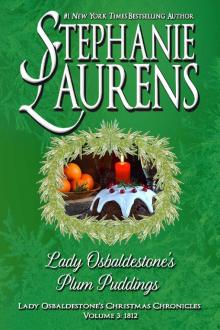 Lady Osbaldestone’s Plum Puddings: Lady Osbaldestone’s Christmas Chronicles Volume 3
Lady Osbaldestone’s Plum Puddings: Lady Osbaldestone’s Christmas Chronicles Volume 3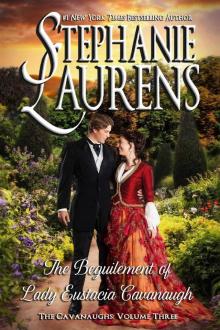 The Beguilement of Lady Eustacia Cavanagh: The Cavanaughs Volume 3
The Beguilement of Lady Eustacia Cavanagh: The Cavanaughs Volume 3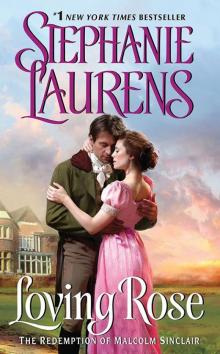 Loving Rose: The Redemption of Malcolm Sinclair (Casebook of Barnaby Adair)
Loving Rose: The Redemption of Malcolm Sinclair (Casebook of Barnaby Adair)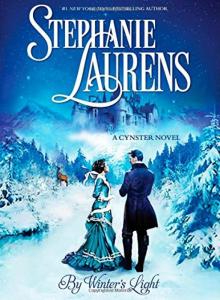 By Winter's Light
By Winter's Light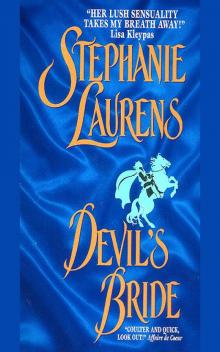 Devil's Bride
Devil's Bride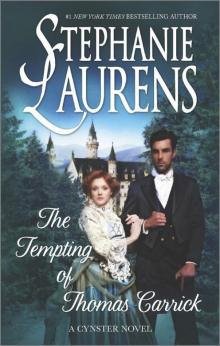 The Tempting of Thomas Carrick
The Tempting of Thomas Carrick![Cynster [22.00] A Match for Marcus Cynster Read online](http://i1.bookreadfree.com/i/03/16/cynster_[22_00]_a_match_for_marcus_cynster_preview.jpg) Cynster [22.00] A Match for Marcus Cynster
Cynster [22.00] A Match for Marcus Cynster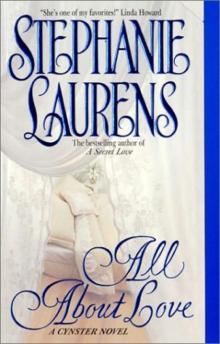 All About Love c-6
All About Love c-6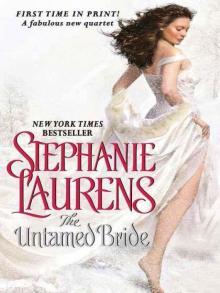 Cobra 01 The Untamed Bride
Cobra 01 The Untamed Bride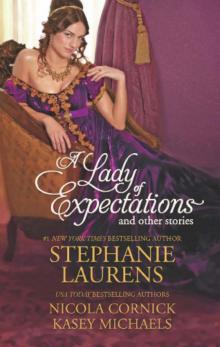 A Lady of Expectations and Other Stories
A Lady of Expectations and Other Stories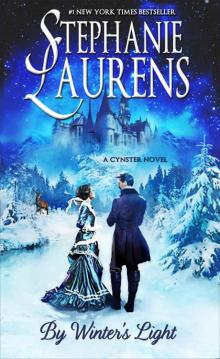 By Winter's Light_A Cynster Novel
By Winter's Light_A Cynster Novel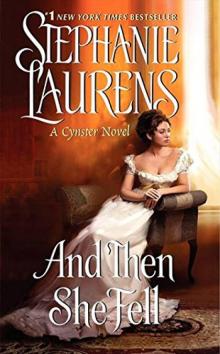 And Then She Fell
And Then She Fell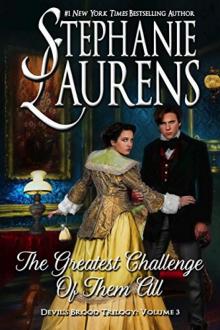 The Greatest Challenge of Them All
The Greatest Challenge of Them All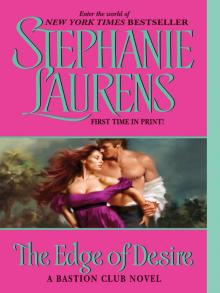 The Edge of Desire
The Edge of Desire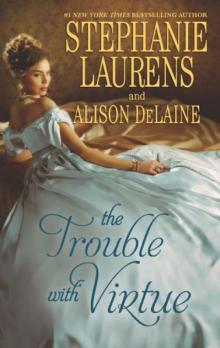 The Trouble With Virtue: A Comfortable WifeA Lady by Day
The Trouble With Virtue: A Comfortable WifeA Lady by Day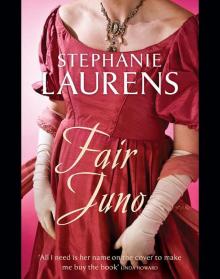 Fair Juno
Fair Juno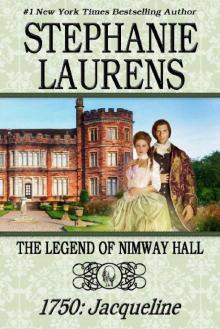 THE LEGEND OF NIMWAY HALL: 1750 - JACQUELINE
THE LEGEND OF NIMWAY HALL: 1750 - JACQUELINE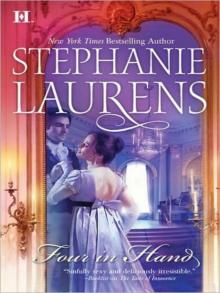 Four In Hand
Four In Hand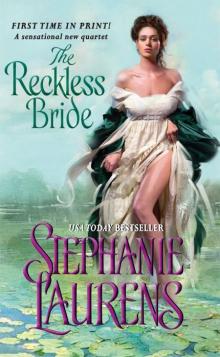 The Reckless Bride
The Reckless Bride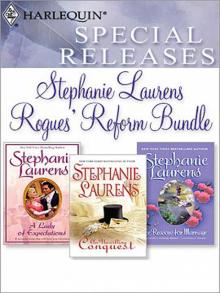 Stephanie Laurens Rogues' Reform Bundle
Stephanie Laurens Rogues' Reform Bundle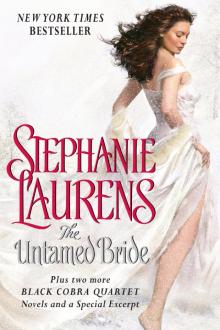 The Untamed Bride Plus Black Cobra 02-03 and Special Excerpt
The Untamed Bride Plus Black Cobra 02-03 and Special Excerpt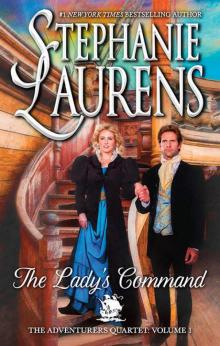 The Lady's Command (Adventurers Quartet #1)
The Lady's Command (Adventurers Quartet #1)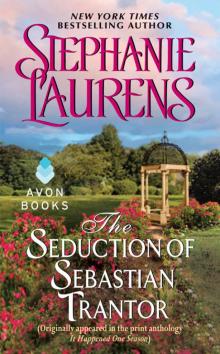 The Seduction of Sebastian Trantor
The Seduction of Sebastian Trantor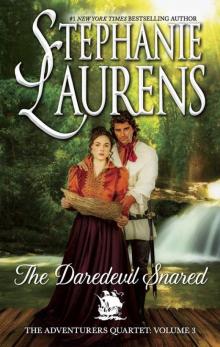 The Daredevil Snared (The Adventurers Quartet Book 3)
The Daredevil Snared (The Adventurers Quartet Book 3)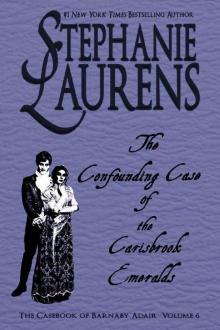 The Confounding Case Of The Carisbrook Emeralds (The Casebook of Barnaby Adair 6)
The Confounding Case Of The Carisbrook Emeralds (The Casebook of Barnaby Adair 6)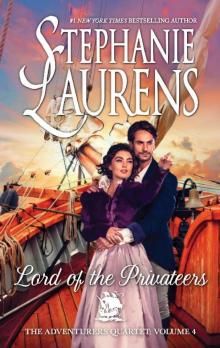 Lord of the Privateers (The Adventurers Quartet)
Lord of the Privateers (The Adventurers Quartet)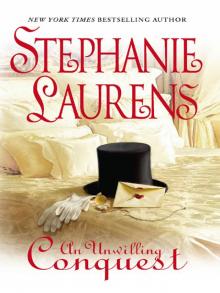 An Unwilling Conquest
An Unwilling Conquest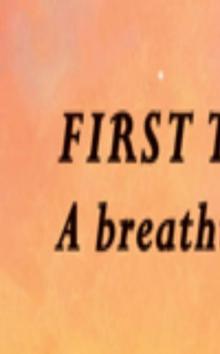 Brazen Bride
Brazen Bride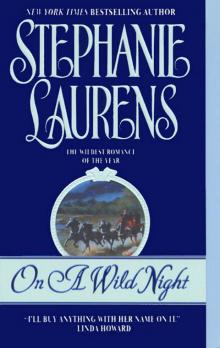 On a Wild Night
On a Wild Night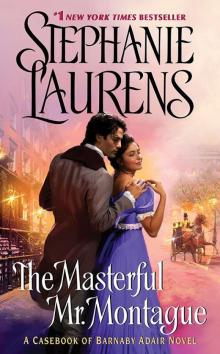 The Masterful Mr. Montague: A Casebook of Barnaby Adair Novel
The Masterful Mr. Montague: A Casebook of Barnaby Adair Novel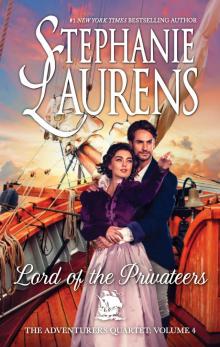 Lord of the Privateers
Lord of the Privateers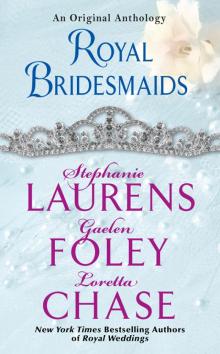 Royal Bridesmaids
Royal Bridesmaids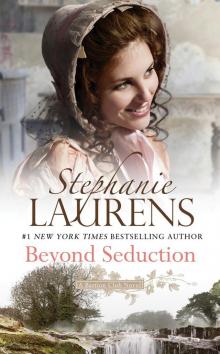 Beyond Seduction
Beyond Seduction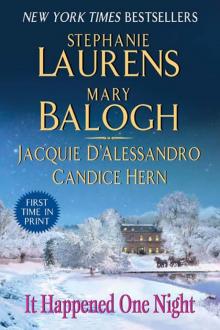 It Happened One Night
It Happened One Night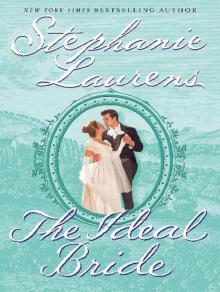 The Ideal Bride
The Ideal Bride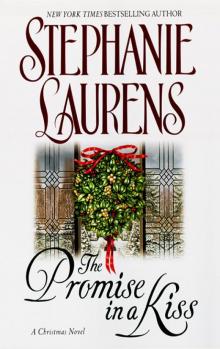 The Promise in a Kiss
The Promise in a Kiss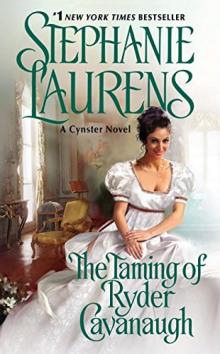 The Taming of Ryder Cavanaugh
The Taming of Ryder Cavanaugh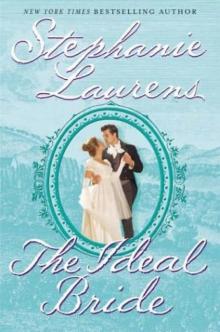 The Ideal Bride c-12
The Ideal Bride c-12 All About Love
All About Love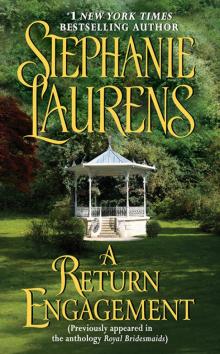 A Return Engagement
A Return Engagement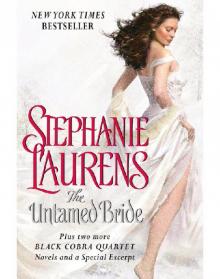 The Untamed Bride Plus Two Full Novels and Bonus Material
The Untamed Bride Plus Two Full Novels and Bonus Material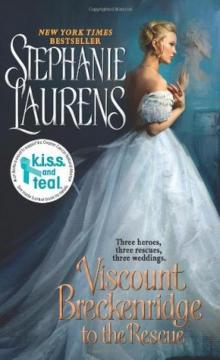 Viscount Breckenridge to the Rescue
Viscount Breckenridge to the Rescue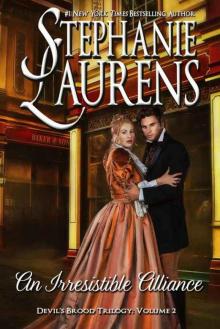 An Irresistible Alliance (Cynsters Next Generation Novels Book 5)
An Irresistible Alliance (Cynsters Next Generation Novels Book 5)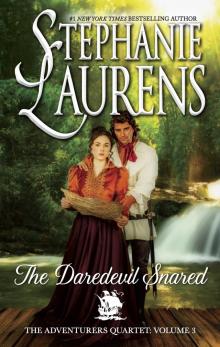 The Daredevil Snared
The Daredevil Snared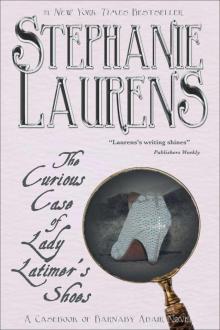 The Curious Case of Lady Latimer's Shoes: A Casebook of Barnaby Adair Novel
The Curious Case of Lady Latimer's Shoes: A Casebook of Barnaby Adair Novel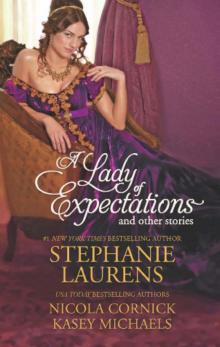 A Lady of Expectations and Other Stories: A Lady of ExpectationsThe Secrets of a CourtesanHow to Woo a Spinster
A Lady of Expectations and Other Stories: A Lady of ExpectationsThe Secrets of a CourtesanHow to Woo a Spinster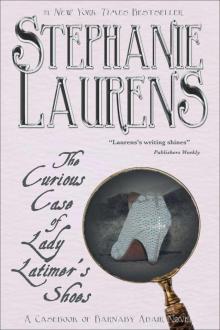 The Curious Case of Lady Latimer's Shoes: A Casebook of Barnaby Adair Novel (The Casebook of Barnaby Adair)
The Curious Case of Lady Latimer's Shoes: A Casebook of Barnaby Adair Novel (The Casebook of Barnaby Adair)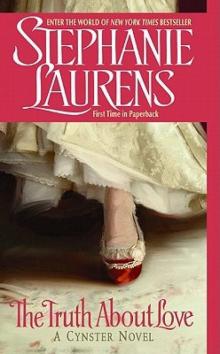 The Truth About Love
The Truth About Love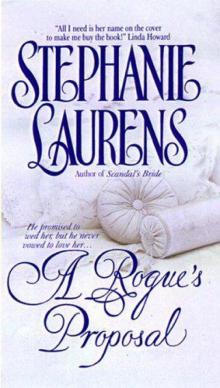 A Rogue's Proposal
A Rogue's Proposal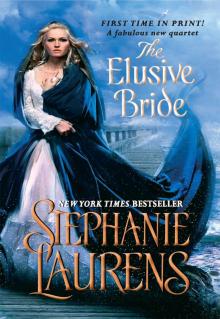 The Elusive Bride
The Elusive Bride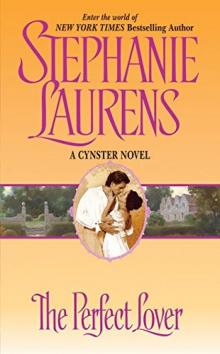 The Perfect Lover
The Perfect Lover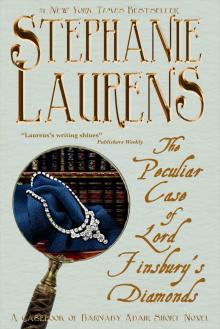 The Peculiar Case of Lord Finsbury's Diamonds: A Casebook of Barnaby Adair Short Novel
The Peculiar Case of Lord Finsbury's Diamonds: A Casebook of Barnaby Adair Short Novel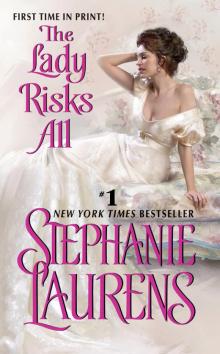 The Lady Risks All
The Lady Risks All The Murder at Mandeville Hall: The Casebook of Barnaby Adair: Volume 7
The Murder at Mandeville Hall: The Casebook of Barnaby Adair: Volume 7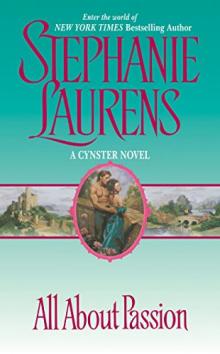 All About Passion
All About Passion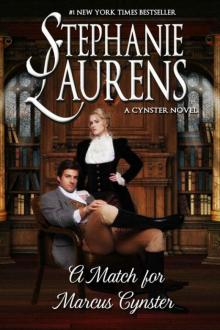 A Match for Marcus Cynster
A Match for Marcus Cynster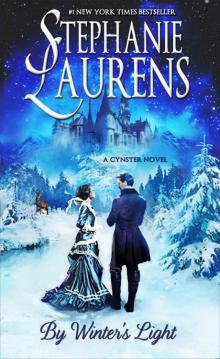 By Winter's Light: A Cynster Novel (Cynster Special Book 2)
By Winter's Light: A Cynster Novel (Cynster Special Book 2)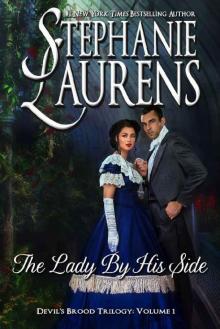 The Lady By His Side
The Lady By His Side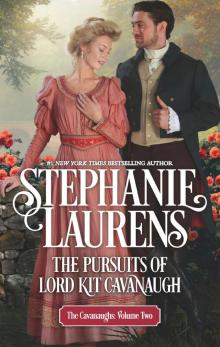 The Pursuits of Lord Kit Cavanaugh
The Pursuits of Lord Kit Cavanaugh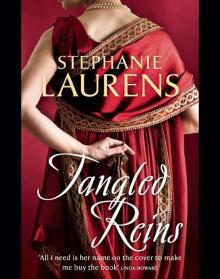 Tangled Reins
Tangled Reins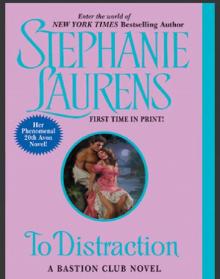 To Distraction
To Distraction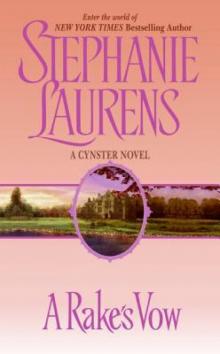 A Rake's Vow
A Rake's Vow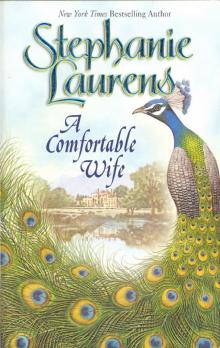 A Comfortable Wife
A Comfortable Wife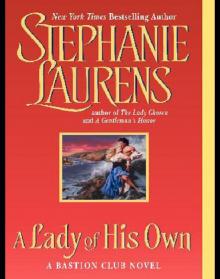 A Lady of His Own bc-3
A Lady of His Own bc-3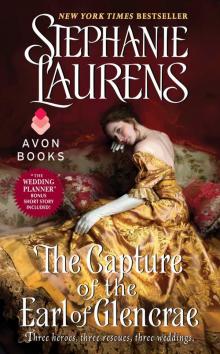 The Capture of the Earl of Glencrae
The Capture of the Earl of Glencrae Scandals Bride c-3
Scandals Bride c-3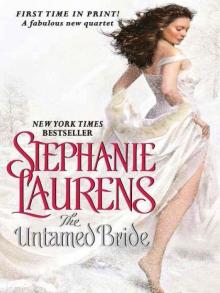 Untamed Bride
Untamed Bride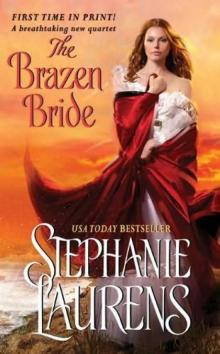 The Brazen Bride
The Brazen Bride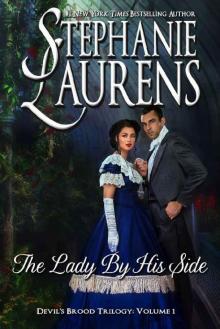 The Lady By His Side (Cynsters Next Generation Novels Book 4)
The Lady By His Side (Cynsters Next Generation Novels Book 4)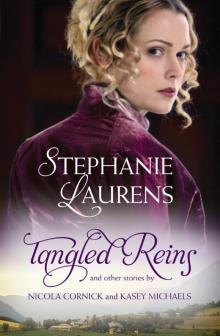 Tangled Reins and Other Stories
Tangled Reins and Other Stories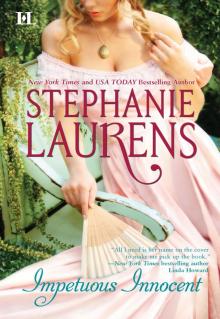 Impetuous Innocent
Impetuous Innocent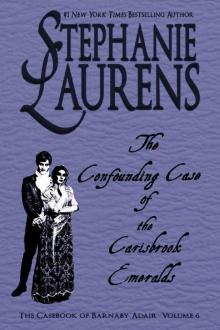 The Confounding Case Of The Carisbrook Emeralds
The Confounding Case Of The Carisbrook Emeralds Stephanie Laurens - B 6 Beyond Seduction
Stephanie Laurens - B 6 Beyond Seduction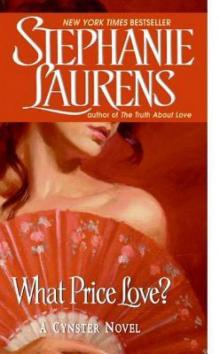 What Price Love?
What Price Love?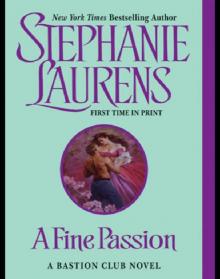 A Fine Passion
A Fine Passion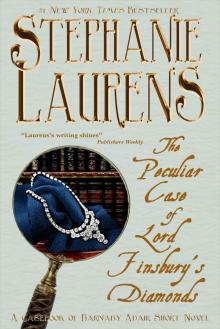 The Peculiar Case of Lord Finsbury's Diamonds: A Casebook of Barnaby Adair Short Novel (The Casebook of Barnaby Adair)
The Peculiar Case of Lord Finsbury's Diamonds: A Casebook of Barnaby Adair Short Novel (The Casebook of Barnaby Adair)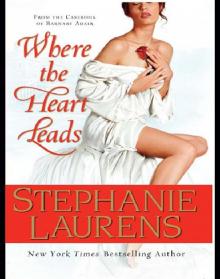 Where the Heart Leads
Where the Heart Leads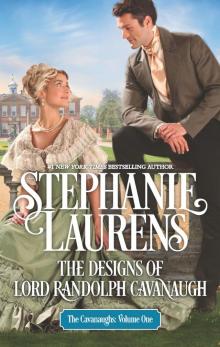 The Designs of Lord Randolph Cavanaugh
The Designs of Lord Randolph Cavanaugh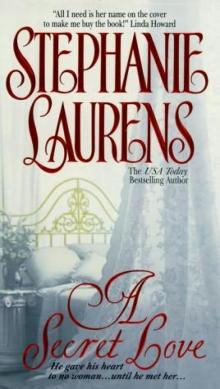 A Secret Love c-5
A Secret Love c-5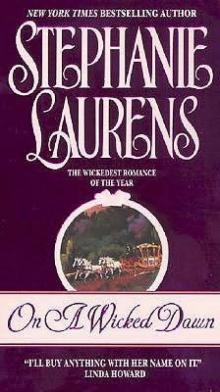 On a Wicked Dawn c-10
On a Wicked Dawn c-10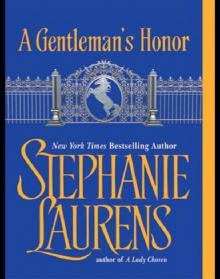 A Gentleman's Honor
A Gentleman's Honor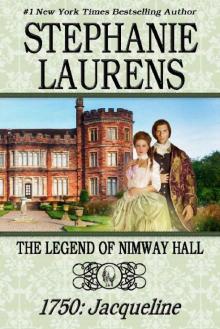 THE LEGEND OF NIMWAY HALL_1750_JACQUELINE
THE LEGEND OF NIMWAY HALL_1750_JACQUELINE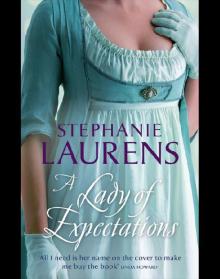 A Lady of Expectations
A Lady of Expectations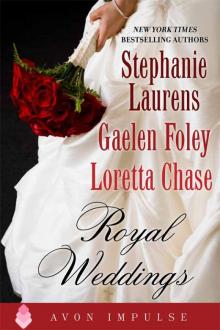 Royal Weddings: An Original Anthology
Royal Weddings: An Original Anthology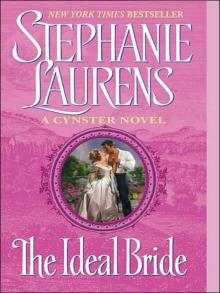 The Ideal Bride (Cynster Novels)
The Ideal Bride (Cynster Novels) Mastered by Love
Mastered by Love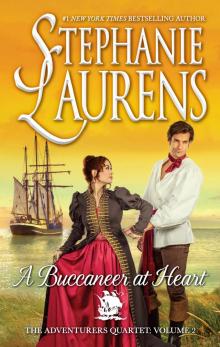 A Buccaneer at Heart
A Buccaneer at Heart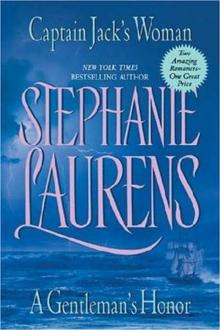 Captain Jack’s Woman / A Gentleman's Honor
Captain Jack’s Woman / A Gentleman's Honor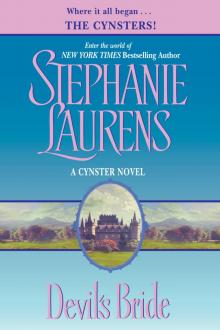 Devil's Bride with Bonus Material
Devil's Bride with Bonus Material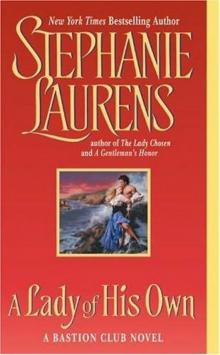 A Lady of His Own
A Lady of His Own A Secret Love
A Secret Love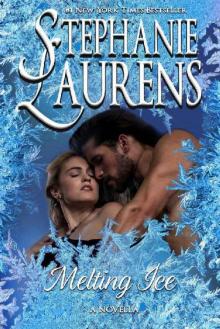 Melting Ice
Melting Ice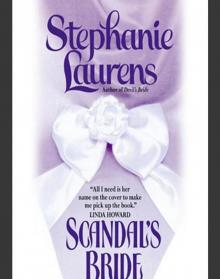 Scandal's Bride
Scandal's Bride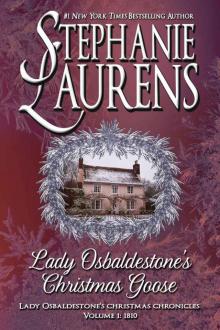 Lady Osbaldestone’s Christmas Goose
Lady Osbaldestone’s Christmas Goose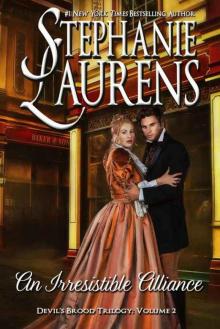 An Irresistible Alliance
An Irresistible Alliance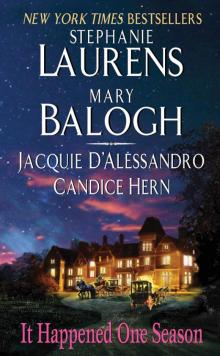 It Happened One Season
It Happened One Season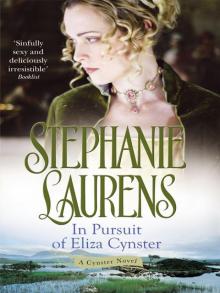 In Pursuit Of Eliza Cynster
In Pursuit Of Eliza Cynster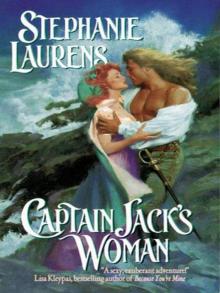 Captain Jack's Woman
Captain Jack's Woman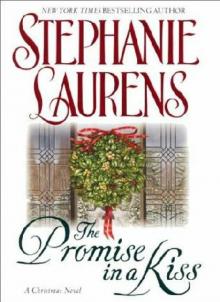 The promise in a kiss c-8
The promise in a kiss c-8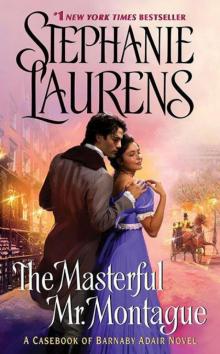 The Masterful Mr. Montague
The Masterful Mr. Montague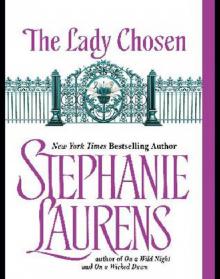 The Lady Chosen
The Lady Chosen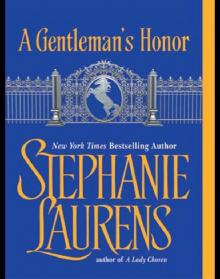 A Gentleman's Honor bc-2
A Gentleman's Honor bc-2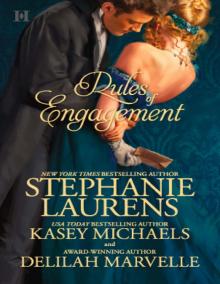 Rules of Engagement: The Reasons for MarriageThe Wedding PartyUnlaced (Lester Family)
Rules of Engagement: The Reasons for MarriageThe Wedding PartyUnlaced (Lester Family) Secrets of a Perfect Night
Secrets of a Perfect Night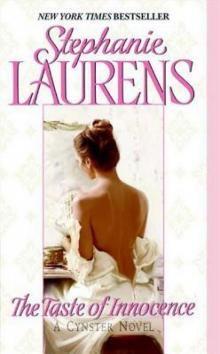 The Taste of Innocence
The Taste of Innocence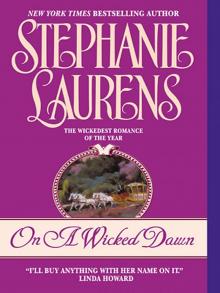 On A Wicked Dawn
On A Wicked Dawn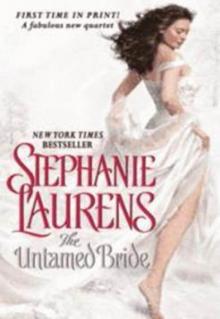 The Untamed Bride
The Untamed Bride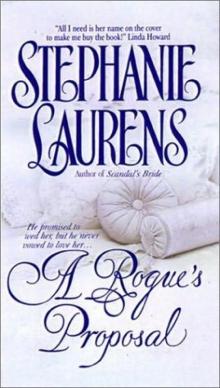 A Rogues Proposal c-4
A Rogues Proposal c-4 Rakes Vow c-2
Rakes Vow c-2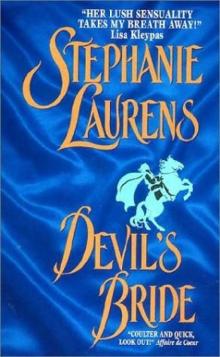 Devils Bride c-1
Devils Bride c-1 Hero, Come Back
Hero, Come Back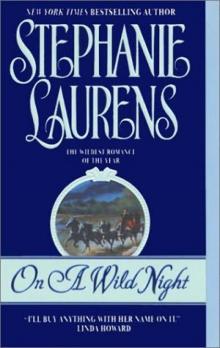 On a Wild Night c-8
On a Wild Night c-8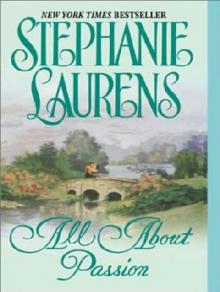 All About Passion c-7
All About Passion c-7